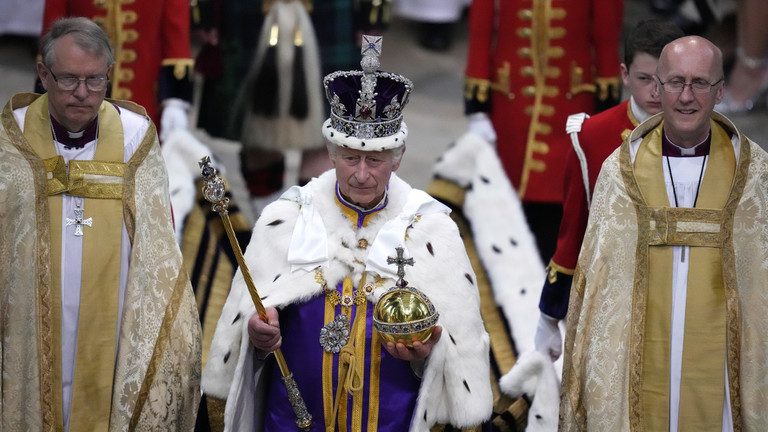Headlines
Crowning of King Charles III

During a magnificent ceremony, swords and scepters were delivered to Britain’s first new king in 70 years.
At a lavish ceremony attended by dignitaries from around the world on Saturday, Britain’s King Charles III was crowned at Westminster Abbey in London. While several demonstrators were detained outside, crowds braved the downpour to witness the 74-year-old officially take office.
Charles was presented with the Sovereign’s Orb and Scepter, which have been granted to British kings since the 17th Century, and anointed with oil from the Mount of Olives in Jerusalem in a ceremony that dates back centuries. A solid gold crown was then placed on the king’s head by Archbishop of Canterbury Justin Welby after he had already been given gold spurs, bracelets, and five swords.
At that time, gun salutes were fired throughout the UK as trumpets rang.
US First Lady Jill Biden, French President Emmanuel Macron, Canadian Prime Minister Justin Trudeau, leaders from the British Commonwealth, and royals from all over the world also attended the occasion. All of the live past prime leaders of the UK were present as Prime Minister Rishi Sunak read from the Bible.
The King replaced the ceremonial crown with the Imperial official Crown, which he will wear on future occasions like the official opening of Parliament, before Charles and Queen Consort Camilla left the monastery.
The royals traveled to Buckingham Palace in a gold carriage as cheering people lined the street.
The Metropolitan Police in London reported that four persons had been detained “on suspicion of conspiracy to cause public nuisance” and that three others had been detained “on suspicion of possessing articles to cause criminal damage” before to the event. Republic, a group opposed to monarchies, reported that police detained its leader, five other members, and hundreds of placards.
Since his late mother, Queen Elizabeth II, was installed as monarch in 1953, the United Kingdom has seen a significant transformation. The ethnic and religious diversity of Britain has greatly decreased since the 1950s, with ethnic minorities today making up about 15% of the population, compared to less than 1% seventy years earlier.
Muslim, Hindu, Buddhist, and Jewish leaders marched into Westminster Abbey together for the first time in history, and Prime Minister Sunak was the first non-Christian prime minister to read from the Bible at the ceremony.
Commonwealth members who live abroad are becoming less interested in maintaining the monarch as their head of state. According to a recent survey conducted by Michael Ashcroft, a former deputy chairman of the Conservative Party, six of these 14 nations, including Canada, Australia, and Jamaica, have majorities that favor becoming republics.
